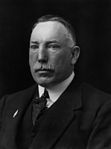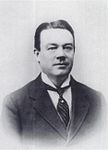| |||||||||||||||||||||||||||||||||||||||||||||||||
All 52 seats to the House of Commons of Northern Ireland 27 seats were needed for a majority | |||||||||||||||||||||||||||||||||||||||||||||||||
|---|---|---|---|---|---|---|---|---|---|---|---|---|---|---|---|---|---|---|---|---|---|---|---|---|---|---|---|---|---|---|---|---|---|---|---|---|---|---|---|---|---|---|---|---|---|---|---|---|---|
| |||||||||||||||||||||||||||||||||||||||||||||||||
 Election results by constituency | |||||||||||||||||||||||||||||||||||||||||||||||||
| |||||||||||||||||||||||||||||||||||||||||||||||||
| (1921–72) |
 |
|---|
The 1929 Northern Ireland general election was held on 22 May 1929. Like all previous elections to the Parliament of Northern Ireland, it produced a large majority for the Ulster Unionist Party. It was the first held after the abolition of proportional representation and the redrawing of electoral boundaries to create single-seat constituencies. As with the rest of the United Kingdom, this has made it more difficult for independent and minor party candidates to win seats.
22 MPs (42%), mostly Ulster Unionists, were elected unopposed without any votes being cast. This began a trend which would continue for decades - until 1969, at least 20 MPs in every Northern Ireland general election would be elected unopposed.
Cite error: There are <ref group=u> tags on this page, but the references will not show without a {{reflist|group=u}} template (see the help page).
Cite error: There are <ref group=n> tags on this page, but the references will not show without a {{reflist|group=n}} template (see the help page).
Cite error: There are <ref group=fn> tags on this page, but the references will not show without a {{reflist|group=fn}} template (see the help page).


